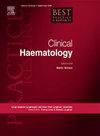CAR-T细胞治疗淋巴瘤的肿瘤微环境
IF 2
4区 医学
Q3 HEMATOLOGY
引用次数: 0
摘要
嵌合抗原受体(CAR)-T细胞疗法已被证明是一种革命性的治疗复发或难治性淋巴瘤的免疫治疗策略,取得了显著的临床疗效。然而,仍存在一些挑战,包括少数患者的治疗耐药性和早期复发。淋巴瘤肿瘤微环境(TME)是由淋巴瘤细胞、免疫细胞、基质成分、细胞因子和细胞外基质蛋白组成的异质性动态环境。CAR-T细胞输注改变TME的组成,从而影响内源性免疫反应。此外,TME的各种成分影响CAR-T细胞的持久性、活性和细胞毒性,这是阻碍CAR-T细胞治疗淋巴瘤疗效的关键内源性因素。本文综述了淋巴瘤TME对CAR-T细胞的作用,并讨论了针对TME成分克服耐药性和提高CAR-T细胞有效性的策略。本文章由计算机程序翻译,如有差异,请以英文原文为准。
Tumor microenvironment in CAR-T cell therapy for lymphoma
Chimeric antigen receptor (CAR)-T cell therapy has proven to be a revolutionizing immunotherapeutic strategy for treating relapsed or refractory lymphoma, achieving remarkable clinical responses. However, there remain some challenges including treatment resistance and early relapse in a minor proportion of patients. The lymphoma tumor microenvironment (TME) is a heterogeneous and dynamic milieu composed of lymphoma cells, immune cells, stromal components, cytokines, and extracellular matrix proteins. CAR-T cell infusion alters the composition of TME and thus impact the endogenous immune response. Additionally, various components of the TME affect the persistence, activity and cytotoxicity of CAR-T cells, which is a key endogenous factor that impeding the efficacy of CAR-T cell therapy in lymphoma. Herein, we review the role of lymphoma TME on CAR-T cells, and discuss strategies targeting TME components to overcome resistance and improve the effectiveness of CAR-T cells.
求助全文
通过发布文献求助,成功后即可免费获取论文全文。
去求助
来源期刊
CiteScore
4.20
自引率
0.00%
发文量
42
审稿时长
35 days
期刊介绍:
Best Practice & Research Clinical Haematology publishes review articles integrating the results from the latest original research articles into practical, evidence-based review articles. These articles seek to address the key clinical issues of diagnosis, treatment and patient management. Each issue follows a problem-orientated approach which focuses on the key questions to be addressed, clearly defining what is known and not known, covering the spectrum of clinical and laboratory haematological practice and research. Although most reviews are invited, the Editor welcomes suggestions from potential authors.

 求助内容:
求助内容: 应助结果提醒方式:
应助结果提醒方式:


